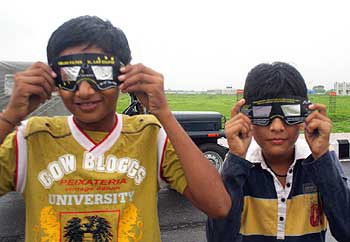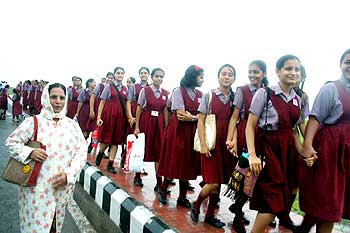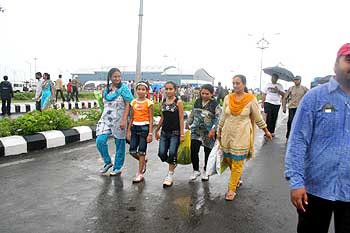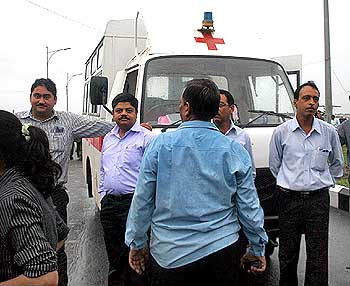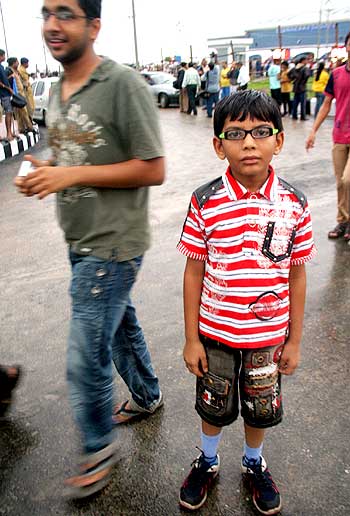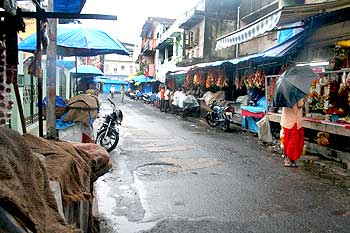 | « Back to article | Print this article |
Thousands turned up to watch the eclipse
A monotonous, steady drizzle, from the wee hours of the morning, did not stop thousands of Surat residents from hitting the road at 5.30 am on July 22.
Traffic was nastily snarled in the pre-dawn hours in the city as they arrived in hordes -- atop scooters and motorcycles, in cars and on buses, kids, infants and grannies in tow -- to view the eclipse originating in India over Surat from the city's best viewing point, the airport.
The media and television hard sell of this rare celestial phenomenon had succeeded in energising the educated, middle class of this town to turn out in droves to see the eclipse as if it were the latest soap opera on television. There was also probably a bit of Gujarat pride involved, in seeing it begin over their state, that brought families, clutching flimsy solar eclipse spectacles and soggy umbrellas, this far on a wretched, wet monsoon morning, though the chances of seeing any sort of extraterrestrial goings-on was close to negligible.
Text: Vaihayasi Pande Daniel
Krishna Bhagwan ne din ko andhera kiya
Says MBBS student Prateeth, "I knew there would be a lot of public and plenty of rain and not much chance of seeing it. But I came because when a group of many people get together there is a kind of 'natural strength' that builds and that can be fun."
Adds businessman Chetan Seth, "Krishna Bhagwan ne din ko andhera kiya (Lord Krishna turned the day into night). And I saw that live! That was something."
Chief minister Narendra Modi was expected as well and a special podium and plenty of security was in place. But the CM, like the sun, was a no show.
Yet, as the sky turned from a hopeful, pale grey to an inky black in a flash, at 6.26 am, as the total eclipse set in, the crowd of about 5,000 to 7,000 gave a proud cheer. The woman emcee, wrapped in a damp sari, anchoring the event urged the crowd, "Suraj ko bye bye keh deejiye (Say goodbye to the sun)". And when the sky lightened once again at 6.30 am, another cheer flowed lustily from the crowd for a phenomenon that was last seen in Surat more than a century ago.
Eclipses are regarded as shadows of doom
"I heard so much about the eclipse that I just had to come here," a young woman explained rapturously to one of the numerous television channels in evidence.
Traditionally and symbolically eclipses are regarded as shadows of doom -- a moment when the gods are no longer in control, when darkness/evil swallows the sun. The superstitious will not eat, bathe or cook a meal during an eclipse and hunker down in their homes till the moment has passed.
"My wife has locked herself at home. She will not even cut an onion even till the surya grahan has passed," says driver Umesh Modi.
'The phenomenon of seeing the sky go dark and then light up again'
But at the Surat airport, it was evident that youngsters, many of them avid students of science, had convinced their parents and families -- superstition be damned -- to make a special trip this morning to see the eclipse.
"Yeh mera beta hai -- Hanil Solanki. Woh eleventh standard science par raha hai (This is my son Hanil Solanki. He is studying science in the 11th standard). He was very interested in the eclipse and said we had to go (to the airport) and that is why we are here," explains one father proudly.
Arun Saxena, who arrived on Tuesday night from Mumbai to see the eclipse, said, "There was a lot of expectation that we would see something. But I am not totally niraash (without hope) because the phenomenon of seeing the sky go dark and then light up again was something special and I am glad I had that experience, even though I did not see the sun."
'That was a miracle'
"From morning it became night," is young Karan Patel Niroba's explanation of what he saw. He arrived at 5.30 am at the airport. "It was wonderful to see, but if we had seen it more clearly it would, of course, have been better," his parents added.
A large contingent of excited, enthusiastic students, in red checked shirts, blue ties and brown pants, from Ryan International Surat, have been camping at the airport since 5 am to see their first eclipse. "It was grand. We saw it go from dark to light and then dark again. That was a miracle," they exclaimed.
The city authorities had made special arrangements for locals to view the eclipse in barricaded enclosures in front of the terminal building. Plenty of extra police personnel had been pressed into service and traffic advice on how to reach the airport was efficiently broadcasted.
Red city buses ferried folks from different parts of the city from before dawn. Large television screens had been set up for the public to see the phenomenon. Eclipse spectacles were selling for Rs 10 a piece. Instructions to not look directly at the sun were doled out at intervals and an astronomer provided a bit of live commentary as well.
'Surprised to see night in the day'
There was not much evidence of the 5,000 tourists expected by Gujarat Tourism in Surat. But a party of 20 Japanese tourists was certainly in the city to witness the eclipse.
Sisters Misako and Yasuko, who hail from Shiga prefecture on Honshu island in southern Japan, are part of this group. Yasuko is an office worker and Misako is a gynaecologist. Months ago they had seen the advertisement for a solar eclipse trip to India combined with a side trip to Aurangabad.
"We are interested in solar eclipses because they are unusual and not an everyday occurrence. And the thought of seeing some of India's historical monuments was appealing. So we said why not?" And they booked a trip to India.
"We were surprised to see night in the day," they say. Before leaving Japan, they knew the chances of actually seeing the sun during the total eclipse were limited, but that did not curb their enthusiasm.
'An eclipse is a bit like a death in the family'
Several well-known temples in Surat were closed on Wednesday morning. Bari Ambajee temple was deserted. Even the flower and prasad (offering) stalls were shut except one or two. "Temples are always closed during an eclipse," explains a priest.
"Today, the usual seven o'clock aarti has not taken place because the temple is closed. Once the eclipse is over and the temple is washed, there will be an aarti at 9.30 am. The main difference is in the timing of the aarti. But yes, after an eclipse, many more people come to the temples. And during the eclipse they do jhap (chant) inside their homes. I did not stay inside but I sat out in the open and did my jhap."
Giving food to the poor is another typical eclipse ritual. The beggars that usually accumulate outside a temple seeking alms were even more numerous as cars of the wealthy stopped to donate old clothes, bananas and paav after the eclipse was over.
Explained the pujari further, "An eclipse is a bit like a death in the family, when nothing is eaten or cooked till the last rites and last journey is completed."
